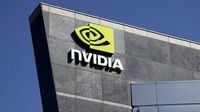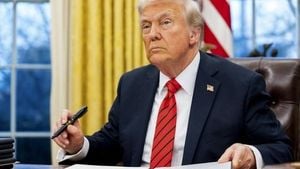China has taken a dramatic step in its ongoing economic contest with the United States, announcing on September 15, 2025, that American tech giant Nvidia violated Chinese anti-monopoly laws in connection with its 2020 acquisition of Mellanox Technologies. The decision, delivered by the State Administration for Market Regulation (SAMR), comes at a critical moment—just as U.S. and Chinese officials are in Madrid for a pivotal round of trade negotiations where advanced chips and artificial intelligence (AI) technology are front and center.
The timing of China’s announcement was no accident, analysts say. In the words of Alfredo Montufar-Helu, managing director at GreenPoint, "Both sides appear to be building leverage to negotiate from a more favorable position, but they are doing this through very calculated moves because they understand the stakes at play," as reported by Reuters. The move, widely interpreted as a strategic countermove to recent U.S. restrictions on Chinese tech firms, sent Nvidia’s shares tumbling—dropping 2.1% in pre-market trading and closing about 1% lower in U.S. trading, according to multiple outlets including Reuters and CNN.
The SAMR’s preliminary investigation, launched in December 2024, concluded that Nvidia breached commitments it made to Chinese regulators as a condition for approving its $6.9 billion acquisition of Israeli networking firm Mellanox Technologies. Specifically, Nvidia was suspected of failing to uphold promises to continue supplying GPU accelerators—crucial for computing and AI—to the Chinese market. The regulator’s brief statement did not elaborate on how Nvidia’s actions violated the law, but it did make clear that a further, deeper investigation would follow.
China’s antitrust law allows for substantial penalties, including fines ranging from 1% to 10% of a company’s annual sales from the previous year. For Nvidia, which reported $17 billion in revenue from China in the fiscal year ending January 26, 2025—about 13% of its total sales—the potential financial impact is significant, though the broader consequences for its business remain uncertain. Analysts like Lian Jye Su from Omdia told Reuters that, "as long as there is no outright ban of Nvidia GPU sales, demand in China will remain," suggesting that the SAMR’s ruling is more about gaining leverage than expelling Nvidia from the Chinese market.
The backdrop to this regulatory action is a rapidly escalating technology rivalry between the U.S. and China. Both countries view AI and the semiconductors that power it as vital to national security and future economic dominance. The U.S. has imposed a series of export controls, most recently in April 2025, restricting sales of advanced AI chips—including Nvidia’s H20 and AMD’s MI308—to China. In response, China has slow-walked exports of rare-earth minerals essential for electronics manufacturing and, just days before the SAMR announcement, the U.S. Commerce Department placed two Chinese chipmakers, GMC Semiconductor Technology Co. and Jicun Semiconductor Technology, on its Entity List, barring them from buying American technology.
Amid these tit-for-tat measures, the Trump administration last month struck a unique deal with Nvidia and AMD: the companies would pay 15% of their semiconductor sales revenues from China to the U.S. government in exchange for licenses to export certain, less advanced versions of their chips to China. Nvidia CEO Jensen Huang, who met with President Trump in the Oval Office in August and is scheduled for another meeting in the UK this week, has been actively courting both U.S. and Chinese officials in an effort to preserve access to the world’s second-largest economy. According to Reuters, Huang has visited China three times this year as part of a "charm offensive," signaling Nvidia’s commitment to the Chinese market despite mounting restrictions.
But China’s patience appears to be wearing thin. In August, its cyberspace regulator summoned Nvidia representatives to discuss whether the H20 chip, which Nvidia tailored specifically for China, posed "backdoor security risks" that could threaten Chinese user data and privacy. State media and social media accounts linked to the Chinese government have openly questioned the security of Nvidia’s chips following the White House’s move to allow their export under strict conditions. Chinese authorities also summoned tech giants like Tencent and ByteDance to explain their purchases of the H20 chip, underscoring Beijing’s growing skepticism about reliance on U.S. technology.
Despite the regulatory heat, the Chinese market remains a critical revenue stream for Nvidia. The company’s H20 chip, launched in 2024, was designed to comply with U.S. export controls and maintain Nvidia’s foothold in China, which accounted for 13% of its global sales that year. However, it’s unclear whether China will continue to accept these chips, especially as the government encourages domestic firms to develop substitutes and reduce dependence on American suppliers. As Plenum’s Zhengyuan Bo told Reuters, "It’s a warning that if the U.S. export control paradigm operates in the same way as in the past several years there will be consequences, and China is willing to inflict damage on U.S. companies."
The latest regulatory salvo is also a signal to Washington that China may not view recent U.S. concessions as favorably as the White House expected. While the Trump administration’s deal with Nvidia and AMD was intended to maintain America’s edge in AI while advancing trade talks, China’s move against Nvidia suggests Beijing is prepared to play hardball. In Madrid, U.S. Treasury Secretary Scott Bessent acknowledged "the poor timing" of China’s announcement, noting that it was discussed during the ongoing trade talks, according to Reuters. The negotiations, now in their fourth round, have been described as progressing well by both sides, but the Nvidia case has added a new layer of complexity and tension.
For Nvidia, the stakes couldn’t be higher. The company’s fortune has soared in recent years on the back of the global AI boom, making it the most valuable company on the U.S. stock market. Yet its ambitions in China are increasingly constrained by geopolitical forces beyond its control. As Alfredo Montufar-Helu put it to Reuters, both Washington and Beijing "understand the stakes at play" and are maneuvering for advantage in a contest that shows no sign of abating.
As the world watches the next moves in this high-stakes chess match, one thing is clear: the battle over chips and AI supremacy is far from over, and for companies like Nvidia, navigating the crosscurrents of U.S.-China rivalry will remain a defining challenge for years to come.






